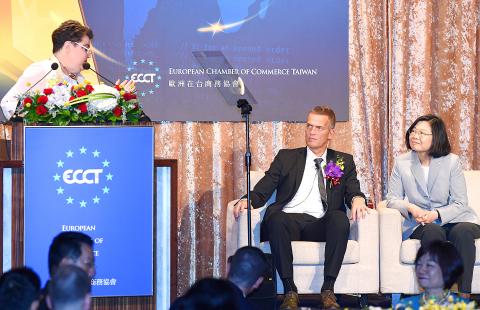The European Chamber of Commerce Taiwan (ECCT) on Thursday called for less hurdles for foreigners wanting live and work in Taiwan to solve its shortage of skilled labor.
“The government should make it easier for foreigners to live and work in Taiwan,” ECCT chairman Hakan Cervell told an audience that included President Tsai Ing-wen (蔡英文), senior government officials and executives from European and Taiwanese companies.
The foreign trade group, which has US$45 billion in direct foreign investments, lauded the labor law revision early this year and said the passage of the Act Governing Recruitment and Employment of Foreign Professionals (外國專業人才延攬及雇用法) was a good first step.

Photo: Liao Chen-huei, Taipei Times
However, further efforts are needed to make Taiwan business-friendly and attractive to foreign talent, it said.
Existing rules mean foreign nationals are treated unequally to Taiwanese residents, with different number formats for Taiwanese identity cards and Alien Resident Certificates, Cervell said.
The practice denies foreign resident card holders access to many services, as more services go online, he said.
Other examples of unequal treatment include foreign residents not being eligible for electric vehicle subsidies or senior citizen discounts on the High-Speed Rail service, he said.
The government could also resolve the shortage of skilled labor by introducing short-term business visas and allowing more foreign workers in the service sector.
The ECCT said it welcomes Taiwan’s effort to speed up the development of the “green” energy industry, but added that many obstacles need to be overcome if the nation wants renewable energy sources to supply 20 percent of electricity by 2025.
Challenges include constructing supporting infrastructure such as electricity grids and harbors, streamlining the permitting process, and resolving financial issues in line with international trends and standards, the chamber said.
“European companies in the wind energy industry are committed to developing Taiwan into a regional manufacturing and support hub for wind energy in Asia. However, it will take time to develop local competence and expertise,” Cervell said.
The ECCT said it supports the creation of smart cities, but the right infrastructure must first be put in place, such as 5G telecommunications, electric vehicle charging stations and smart grids, Cervell said, adding that the regulatory environment must be flexible enough to allow technological innovation and new business models.
The ECCT supports making English the second official language of Taiwan, as English is the global language of business, diplomacy and international organizations.
“Making English an official language would make Taiwan more attractive to international investors and give Taiwan more access to the world,” Cervell said.

PATENTS: MediaTek Inc said it would not comment on ongoing legal cases, but does not expect the legal action by Huawei to affect its business operations Smartphone integrated chips designer MediaTek Inc (聯發科) on Friday said that a lawsuit filed by Chinese smartphone brand Huawei Technologies Co (華為) over alleged patent infringements would have little impact on its operations. In an announcement posted on the Taiwan Stock Exchange, MediaTek said that it would not comment on an ongoing legal case. However, the company said that Huawei’s legal action would have little impact on its operations. MediaTek’s statement came after China-based PRIP Research said on Thursday that Huawei filed a lawsuit with a Chinese district court claiming that MediaTek infringed on its patents. The infringement mentioned in the lawsuit likely involved

Taipei is today suspending work, classes and its US$2.4 trillion stock market as Typhoon Gaemi approaches Taiwan with strong winds and heavy rain. The nation is not conducting securities, currency or fixed income trading, statements from its stock and currency exchanges said. Authorities had yesterday issued a warning that the storm could affect people on land and canceled some ship crossings and domestic flights. Taiwan Semiconductor Manufacturing Co (TSMC, 台積電) expects its local chipmaking fabs to maintain normal production, the company said in an e-mailed statement. The main chipmaker for Apple Inc and Nvidia Corp said it has activated routine typhoon alert

GROWTH: TSMC increased its projected revenue growth for this year to more than 25 percent, citing stronger-than-expected demand for AI devices and smartphones The Taiwan Institute of Economic Research (TIER, 台灣經濟研究院) yesterday raised its forecast for Taiwan’s GDP growth this year from 3.29 percent to 3.85 percent, as exports and private investment recovered faster than it predicted three months ago. The Taipei-based think tank also expects that Taiwan would see a 8.19 percent increase in exports this year, better than the 7.55 percent it projected in April, as US technology giants spent more money on artificial intelligence (AI) infrastructure and development. “There will be more AI servers going forward, but it remains to be seen if the momentum would extend to personal computers, smartphones and

Catastrophic computer outages caused by a software update from one company have once again exposed the dangers of global technological dependence on a handful of players, experts said on Friday. A flawed update sent out by the little-known security firm CrowdStrike Holdings Inc brought airlines, TV stations and myriad other aspects of daily life to a standstill. The outages affected companies or individuals that use CrowdStrike on the Microsoft Inc’s Windows platform. When they applied the update, the incompatible software crashed computers into a frozen state known as the “blue screen of death.” “Today CrowdStrike has become a household name, but not in